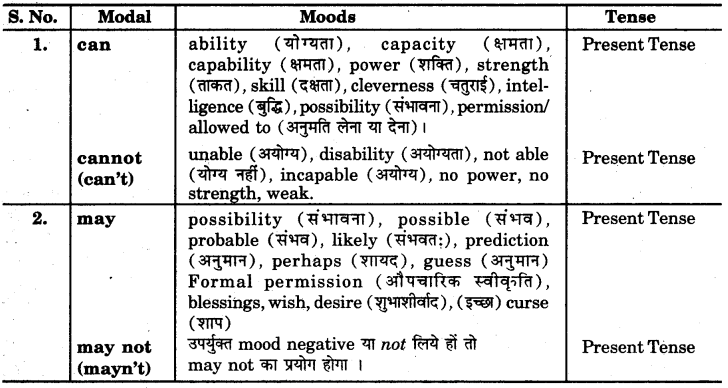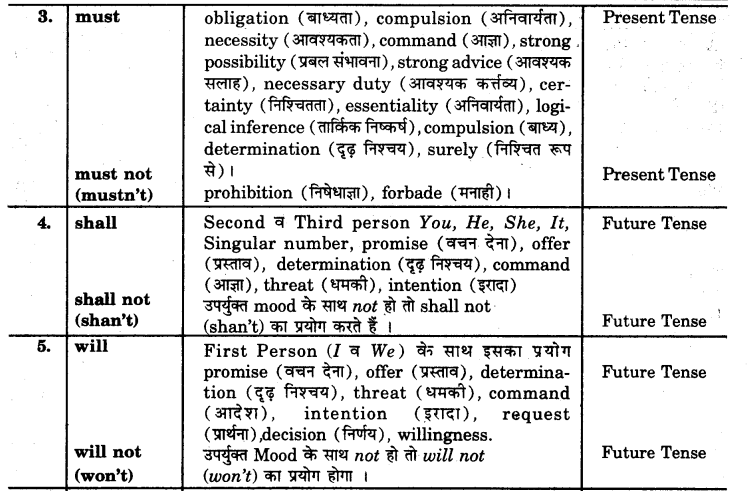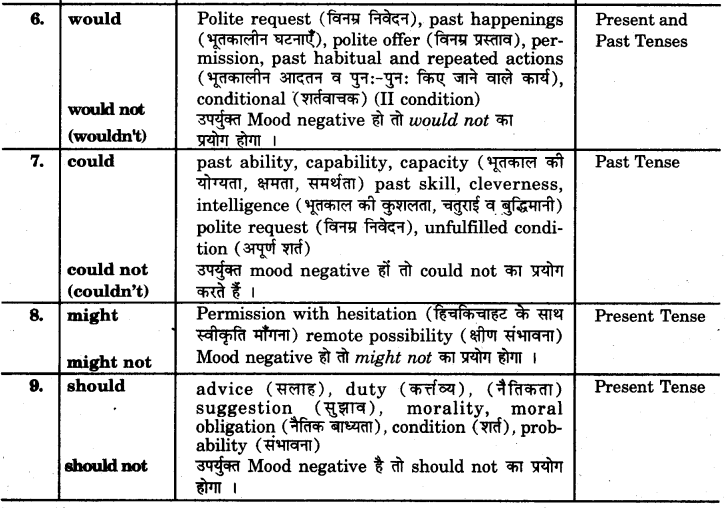RBSE Solutions for Class 7 English Grammar Modals Questions and Answers can be a valuable resource for students from an exam point of view. You can download the RBSE Solutions for Class 7 English free of cost and clarify your doubts alongside understanding of concepts. Students are advised to solve these solutions in order to attempt the exam well and score good results.
Rajasthan Board RBSE Class 7 English Grammar Modals
Models: ये Mood showing Verbs होती हैं । इनकी जानकारी के पहले Auxiliary Verbs के बारे में जानकारी होनी चाहिये । Auxiliary Verbs सहायक क्रियाएँ (Helping Verbs) होती हैं ।
Kinds of Auxiliary Verbs
सहायक क्रियाएँ दो प्रकार की होती हैं –
(A) Primary Auxiliaries (प्राथमिक सहायक क्रियाएँ)
(B) Modal Auxiliarries (विधिसूचक सहायक क्रियाएँ)
(A) Primary Auxiliary Verbs
इनमें केवल Be के विभिन्न रूप – is, am, are, was, were; have के विभिन्न रूप – has, have, had; do के विभिन्न रूप – do, does, did आदि आते हैं।
उदाहरण :
- Hari is reading a novel.(Auxiliary Verb)
- Heena was sleeping. (Auxiliary Verb)
- I did not know him. (Auxiliary Verb)
- Do you like sweets ? (Auxiliary Verb)
- I have done my work. (Auxiliary Verb)
- Hari has a.car. (Full Verb)
(B) Modal Auxiliary Verbs
Modal शब्द प्रवृत्ति, व्यवहार, मन:स्थिति, इरादा, क्षमता आदि को व्यक्त करता है। जो क्रियाएँ किन्हीं पूर्ण क्रियाओं
(Full Verbs) के साथ प्रयुक्त होकर सम्भावना, अनुमति, आभार, बाध्यता, कर्तव्य, धमकी, वचन, दृढ़-निश्चय, प्रस्ताव, इच्छा, सुझाव, प्रार्थना, प्रतिबन्ध, निषेध, योग्यता तथा भूतकाल की आदतों को व्यक्त करती हैं, उन्हें Modal Auxiliary Verbs कहते हैं।
Modal Auxiliary Verbs की विशेषताएँ
1. ये हमेशा मुख्य क्रिया के साथ प्रयुक्त होती हैं। Modal के बाद V1 , का प्रयोग किया जाता है। Passive होने पर be + V3 , का प्रयोग होता है।
उदाहरण :
(a) He should obey his parents.
(b) You shall be given the prize.
2. इन पर कर्ता (Subject) के वचन (Number), लिंग (Gender) (पुल्लिंग, स्त्रीलिंग) का कोई प्रभाव नहीं पड़ता।
उदाहरण :
(a) He can run fast.
(b) She can cook well.
3. इनके बाद not लगाने से Negative तथा Modal को Subject के पहले रखने से वाक्य Interrogative बन जाता है।
उदाहरण :
(a) He cannot lift this heavy box.
(b) What can you do ?
4. एक ही वाक्य में Primary व Modal Auxiliary Verb का प्रयोग हो सकता है, लेकिन Modal Auxiliary का प्रयोग Primary Auxiliary के पहले होगा।
उदाहरणे :
I might have gone to the party. यहाँ might Modal Auxiliary तथा have Primary Auxiliary है।
5. Third Person (Singular) Subject के साथ Modal Auxiliary में s या es नहीं जोड़ा जाता है।
उदाहरण :
(a) Heena may go home.
(b) Sheela can run fast.
6. Modal Auxiliary Verb के बाद Infinitive ” without to’ आता है।
उदाहरण :
Hari can do this work well.
1. USE OF ‘CAN’
Can का अर्थ है – सकना। इसका प्रयोग Present Tense में निम्न भाव प्रकट करने के लिए होता है – (A) योग्यता (ability), क्षमता (capacity) या शक्ति (power) का भाव प्रकट करने के लिए। जैसे :
1. I can teach mathematics. (ability) मैं गणित पढ़ा सकता हूँ । (मुझमें गणित पढ़ाने की योग्यता है ।) (योग्यता)
2. A blind man cannot see. एक अंधा आदमी नहीं देख सकता । (capacity)
(अन्धे आदमी में देखने की क्षमता नहीं होती, अतः
नहीं देख सकता है।)
3. we curt climb up this high tree.
हम इस ऊँचे पेड़ पर चढ़ सकते हैं । (pouver)
(हममें इस ऊँचे पेड़ पर चढ़ने की शक्ति है ।) (शक्ति) :
4. I can lift this heavy box.
मैं इस भारी बक्से को उठा सकता हूँ । (strength)
(मुझमें इस भारी बक्से को उठाने की ताकत है।) (ताकत)
5. I can solve this puzzle. (intelligence)
मैं इस पहेली को हल कर सकता हूँ ।
(मुझमें इस पहेली को हल करने की बुद्धि है ।) (बुद्धि)
6. I can be fool him. (cleverness)
मैं उसे मूर्ख बना सकता हूँ । (चतुराई)
(B) अनुमति या आदेश देने या लेने का भाव प्रकट करने के लिए :
उदाहरण :
- You can go now. (order)
अब तुम जा सकते हो । (आज्ञा देना) - Can I use your pen? (permission)
क्या मैं आपकी कलम प्रयोग कर सकता हूँ? (स्वीकृति लेना)
Note : can का प्रयोग अनौपचारिक रूप से permission लेने के लिए किया जाता है।
(C) सम्भावना या असम्भावना व्यक्त करने के लिए :
“The Ramayana’ can be found in the household of every Hindu. ‘रामायण’ प्रत्येक हिन्दू के परिवार में पाई जा सकती (सम्भावना)
नोट – किसी बात की सम्भावना जानने के लिए जब प्रश्न किया जाता है तो can का ही प्रयोग किया जाता है, may का नहीं। जैसे –
- Can the blind see?
- Can the lame run ?
2. USE OF ‘COULD’
Could, can का Past है। could का अर्थ है ‘सका’ या ‘सकता था। इसका प्रयोग Past Tense में योग्यता (ability), क्षमता (capacity या capability), शक्ति (power), चतुराई (cleverness), बुद्धि (intelligence), संभावना (possibility), विन्रम निवेदन व्यक्त करने के लिए होता है।
- I could speak English when I was only five years old. (ability of past) जब मैं पाँच वर्ष की उम्र का था तब अंग्रेजी बोले सकता था। (भूतकाल की योग्यता)
- My brother could not send me a money order last month. (absence of capacity) मेरा भाई पिछले माह मुझे मनीऑर्डर नहीं भेज सका । (क्षमता का अभाव)
- I could run fast when I was young. (power) जब मैं युवक था तब तेज दौड़ सकता था (शक्ति)
- Umesh could go out whenever he (permission) उमेश जब चाहता बाहर जा सकता था । (अनुमति)
- I could attend the function. (possibility) मैं उत्सव में सम्मिलित हो सकता था। (सम्भावना)
- Could you lend me your pen ? क्या तुम मुझे (इसी समय) अपनी कलम उधार दे सकते हो ? :
3. USE OF ‘MAY’
May का अर्थ भी ‘सकना’ होता है । इसका प्रयोग Present Tense में अनुमति लेने या देने, संभावना (possibility), शुभकामना या मनोकामना (wish), आशीर्वाद (blessings) या शाप देने (curse) के लिए किया जाता है ।
उदाहरण :
- May I come in, sir ?(formal permission) क्या मैं अन्दर आ सकता हूँ, श्रीमान ?
- You may go home. तुम घर जा सकते हो । (giving permission) wanted.
- Today is Sunday. He may go home. (possibility)
- May you live long! (wishing well) Note : नकारात्मक वाक्यों के लिए may not का प्रयोग होगी।
4. USE OF ‘MIGHT’
Might may का Past Form है। इसका प्रयोग निम्न प्रकार से किया जाता है –
(A) प्रश्नवाचक वाक्यों में विनम्रतापूर्वक एवं हिचकिचाहट
पूर्वक अनुमति माँगने के लिए : Might I use your telephone ?
क्या मैं आपके टेलीफोन का प्रयोग कर सकता हूँ?
नोट – यद्यपि अनुमति माँगने के लिए वर्तमान काल के प्रश्नवाचक वाक्यों में may का प्रयोग होता है पर might से अत्यन्त विनम्रतापूर्वक अनुमति माँगने का भाव प्रकट होता है। इन वाक्यों से संकोच या संदेह का भाव भी प्रकट होता
(B) बीती हुई संभावना प्रकट करने के लिए :
Your eldest son might have become a doctor.
तुम्हारा सबसे बड़ा लड़का डॉक्टर बन सकता (पर बना नहीं)।
(C) अत्यन्त क्षीण सम्भावना प्रकट करने के लिए :
Take a taxi. You might catch the train.
टैक्सी ले लो। तुम्हें गाड़ी मिल सकती है।
(जिसकी सम्भावना बहुत कम है)।
Note: वाक्ये नकारात्मक हो तो might not का प्रयोग होगा।
5. USE OF ‘WILL’
I, We के साथ will का प्रयोग वायदा दृढ़ निश्चय, धमकी चेतावनी, इच्छा, प्रस्ताव व्यक्त करता है। जैसे
- I will accompany you to Jaipur.
मैं (वायदा करता हूँ कि तुम्हारे साथ जयपुर जाऊँगा। - I will go to Agra.
मैं (निश्चित रूप से) आगरा जाऊँगा। - We will fight against injustice.
हमे (निश्चित रूप से) अन्याय के विरुद्ध लड़ेंगे । - I will arrest you.
मैं (धमकी देता हूँ कि) तुम्हें गिरफ्तार कर लूंगा - I will join the army after two years.
(मेरी इच्छा है कि), मैं दो वर्ष बाद सेना में शामिल होऊंगा।
Note : वाक्य नकारात्मक (Negative) हो तो will not या won’t का प्रयोग होगा ।
6. USE OF ‘SHALL’
Second Person (you) तथा Third Person (he, she, it, name, they व it) के साथ shall लगाने पर यह shall Modal Auxiliary Verb का कार्य करेगा तथा वायदा, आज्ञा, धमकी, कानूनी नोटिस, प्रस्ताव, पक्का इरादा, आदि भावों को प्रकट करेगा। जैसे
- You shall get a prize for this bravery.
(वायदा) (वायदा किया जाता है कि) इस बहादुरी के लिए तुमको इनाम मिलेगा । - He shall not attend the class.
वह कक्षा में उपस्थित नहीं होगा । (आज्ञा) उसको कक्षा में उपस्थित होने की आज्ञा नहीं दी जायेगी। - He shall be punished if he doesn’t behave properly..
(धमकी) अगर वह अच्छा व्यवहार नहीं करेगा तो उसे दण्डित किया जाएगा । - Tresspassers shall be punished.
(कानूनी चेतावनी) बिना अनुमति के घुसने वाले दण्डित किये जायेंगे । - Shall I ring the doctor for you?
(प्रस्ताव करने हेतु) Note : वाक्य नकारात्मक होने पर shall not या shan’t का प्रयोग होगा ।
7. USE OF ‘MUST’
Must का तात्पर्य है ‘निश्चित रूप से चाहिये। इस Modal का प्रयोग अनिवार्यता (compulsion), आवश्यकता : (necessity), बाध्यता (obligation), प्रबल सम्भावना | (strong possibility), आवश्यक सलाह/परामर्श (strong advice), तर्कसंगत निक्तर्ण (logical inference) आदि को व्यक्त करने के लिए किया जाता है। जैसे
- We must reach school in time.
(अनिवार्यता) | हमें समय पर विद्यालय पहुँचना ही चाहिये। - They are in a new dress. They must be going to a party. वे नये कपड़ों में हैं । वे निश्चित रूप से पार्टी में जा रहे होंगे। (प्रबल संभावना)
- You must stay where you are.
तुम्हें वहीं रुकना चाहिए जहाँ तुम हो । (आज्ञा) - You are getting late. You must hire a taxi.
तुम्हें देर हो रही है । अतः (परामर्श है कि) तुम्हें टैक्सी किराये पर ले लेनी चाहिए। (परामर्श) - Hari is an intelligent boy. He must get first division. (तर्क संगत निष्कर्ष)
Use of ‘Must Not’
- प्रतिबन्ध (Prohibition) के लिए must not का प्रयोग होता है। जैसे
You have TB. You must not smoke. - आदेश तथा चेतावनी के साथ नकारात्मक सलाह व्यक्त करने के लिए :
You must not sit here.
8. USE OF ‘WOULD’
will का Past Tense Form would है। परन्तु इसका प्रयोग polite request (विनम्र निवेदन), past happenings (भूतकालीन घटनाओं), intention (इरादा ज्ञात करने), others’ wishes (दूसरों की इच्छाओं), आदि हेतु होता है । वाक्य Negative होने पर would not का प्रयोग होगा ।
- Would you lend me your pen ? क्या आप मुझे (इसी समय) अपनी कलम उधर देंगे ? (विनम्र निवेदन)
- Would you tell me the way to the hotel ? क्या आप मुझे (इसी समय) होटल का रास्ता बतायेंगे ? (विनम्र निवेदन)
नोट – वर्तमान काल में आग्रह करने के लिए until के स्थान पर would के प्रयोग से अधिक नम्रता का भाव प्रदर्शित होता है। - Sometimes my father would get angry with me. कभी-कभी मेरे पिता मुझसे क्रोधित हो जाते थे। (भूतकाल की घटना)
- Would you like to have some tea ? क्या आप थोड़ी चाय लेना चाहेंगे ? (इरादा ज्ञात करने हेतु).
- I would obey you even if I die. |मैं आपकी आज्ञा मानूंगा चाहे मैं मर ही जाऊँ । (इरादा प्रकट करना)
9. USE OF ‘SHOULD’
Should का अर्थ चाहिये” होता है। इसका प्रयोग advice (सलाह), suggestion (सुझाव), duty (कर्तव्य), probability or expectation (अनुमान या सम्भावना), conditional (शर्त वाले वाक्य) में lest (ऐसा न हो कि) के बाद होता है। इसका प्रयोग shall के Past के रूप में भी होता है। सामान्यतः परीक्षा में advice व duty के लिए ही इसे पूछा जाता है। जैसे
- We should bathe daily.
हमें प्रतिदिन स्नान करना चाहिए (advice) - He should not go there.
उसे वहाँ नहीं जाना चाहिए। (suggestion) - We should obey the elders.
हमें बड़ों की आज्ञा माननी चाहिए (duty) - He should be at the theater. (Probability)
(संभावना है या ऐसा अनुमान है कि) वह नाट्यशाला में मौजूद हो। - Should it rain, we shall not go home.
(Should it rain = If it rains)
यदि वर्षा हुई तो हम घर नहीं जायेंगे। - Walk carefully lest you should fall.
संभलकर चलो कहीं ऐसा न हो कि तुम गिर जाओ
निम्न चार्ट के अनुसार को समझने में आसानी रहेगी



Exercise 1
Use the correct modal from the brackets : कोष्ठकों में से सही modal का प्रयोग कीजिए :
- The last train has left. He ……….. stay in the night here. (compulsion) (can/should/might/must)
- The examinations are near. You ………. work hard. (advice) (may/can/should/might)
- He is a strong man. He ……….. lift this box. (capacity) (can/may/might/could)
- We are getting late. We ……….. take a taxi to reach the bus stand. (advice) (can/must/may/should)
- There are clouds in the sky. It rain. (possibility) (could/might/may/shall)
- The student was very clever. He solve any problem. (past ability) (can/could/should/would)
- It is a very good book. You ……….. read it. (suggestion)(could/might/will/should)
- She ………. dance very well when she was very young. (past ability) (can/could/may/might)
- You ……….. reach the town before sunset. ……… (strong advice) (must/would/will need)
- We ……….. not disobey our parents. (moral obligation) (may/should/will/need)
- I promise you ………. be given a nice gift. (promises) (will/shall/can/may)
- “……….. I use your pen ?” said the stranger. (permission with hesitation) (Might/Should/Would/Ought)
Answer:
- must
- should
- can
- should
- may
- could
- should
- could
- must
- should
- shall
- Might
Exercise 2
(From the Text Book)
Fill in the blanks with the modal according to the mood given in the brackets. कष्ठकों में दी गई मनः स्थिति के अनुसार रिक्त स्थानों की पूर्ति modal से करो
- The defaulters ………………….. be penalized and prosecuted. (command)
- Even members of the Royal family ………… not shoot animals there. (polite offer)
- Only rich men ……………….. afford schooling in public school. (ability)
- I ……………….. bear with this new expense. (disability)
- He ………….. help us solve our problems. (capacity)
- Vidya ……………… get a free uniform owing to your low financial status. (probability)
- All of us ……………… be careful about disposing the waste. (compulsion)
- We ………… never throw it carelessly. (advice)
- We ………………….. always dump it into garbage bin. (moral obligation)
- Some of the waste from the kitchen ………………. be dumped into a pit in the garden. (possibility)
- This manure ……………. make the garden soil fertile. (possibility)
- We ……………….. encourage people to bring their own reusable bags for packing (intelligence)
- Used paper waste …………… also be recycled for making cards, card boards, boxes and plates. (capability)
- Abhay ………………… spend hours together in front of the screen. (past habit)
- He ……………… believe what was happening. (past disability)
- The forest … ……………. be left to grow back. (necessity)
- I’m sorry to say that I ………….. not bring up a plant. (inability in past)
- At last, they ……………… get their true successor. (past ability)
- The Panwars tried everything they ……………. for the treatment of their son. (past capacity)
- Now I’m sure I …………………. purge myself of this bad habit. (intention)
Answer:
- shall
- would
- can
- can’t
- can
- may
- must
- should
- should
- can
- can
- can
- can
- would
- could
- must
- could
- could
- could
- will
Hope the knowledge shared regarding the RBSE Solutions for Class 7 English on Grammar Modals Questions and Answers helped you prepare in the right manner. Outshine your exam with wonderful marks by preparing from here. Keep in touch with our site to know the latest updates on RBSE Solutions of various classes.